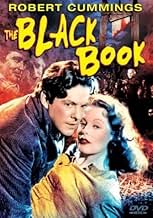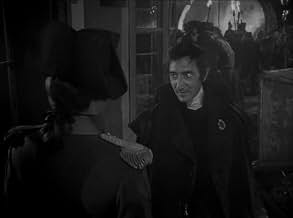Robespierre, figure puissante de la Révolution française, cherche désespérément son livre noir, une liste de morts parmi ceux marqués pour la guillotine.Robespierre, figure puissante de la Révolution française, cherche désespérément son livre noir, une liste de morts parmi ceux marqués pour la guillotine.Robespierre, figure puissante de la Révolution française, cherche désespérément son livre noir, une liste de morts parmi ceux marqués pour la guillotine.
- Prix
- 1 victoire au total
- Citizen
- (uncredited)
- Robespierre's Shooter
- (uncredited)
- Citizen
- (uncredited)
- Citizen
- (uncredited)
- Bourdon
- (uncredited)
- Gatekeeper
- (uncredited)
- Saint Just's Sentry
- (uncredited)
- Danton
- (uncredited)
- Mme. Duval
- (uncredited)
Avis en vedette
The plot centers on Robespierre (a peruked Richard Basehart), who has embarked on a spree of mock trials and executions of his rivals in preparation to having himself proclaimed dictator; he's just disposed of Danton. A less than adulatory element loyal to the ideals of the newly formed Republic, but not to its current leaders, aims to stop him. One of their operatives (Robert Cummings) infiltrates Robespierre's inner circle by posing as the `butcher of Strasbourg,' a regional tyrant as bloodthirsty as Robespierre himself.
But in the circle of men closest to the power of the state, trust is a commodity in short supply; they watch their own backs and scheme to stab each others'. It's Cummings' job to negotiate this maze of duplicity and locate Robespierre's `black book,' in which he records neither his amatory conquests nor vintages he's sampled but his next victims. Exposure of this book will mean Robespierre's downfall. With the aid of proto-Bondgirl Arlene Dahl, Cummings races the clock in a round of near-fatal wild goose chases.
Reign of Terror remains a costumed adventure a chase movie but Mann paces it swiftly and slyly. And, fresh from some ground-breaking work in film noir, he and Alton give it a compellingly sinister look. Most period pieces are lit as if on the equator at high noon; this has to be the inkiest costume movie ever filmed (even Charles McGraw, as a bearded soldier of the Republic, goes all but unrecognizable). The darkness doesn't limit itself to the lighting the script, by Aeneas MacKenzie and Philip Yordan, rustles with ambiguous motives and queer twists. There's even an ironic note of premonition sounded at the end, when the slimy survivor Fouché (Arnold Moss), asks the name of a young soldier. `Bonaparte,' comes the answer. `Napoleon Bonaparte.'
Thank goodness for Turner Classic Movies... it had been many years since I had seen it for the first time on television. Thanks to DVR I was able to record this film when it was played on TCM recently. This movie shows that with good acting, literate dialogue, and a great screenplay are what makes for an entertaining movie, which are in short supply today which too often offer computerized graphics, amateurish acting, and repetitive and crass dialogue instead. Kudos to Anthony Mann and the cinematographer for a great movie.
At one time, the French Revolution (and the subsequent Napoleonic era) captivated numerous novelists and film-makers alike, and they could comfortably assume that their readers and audiences were familiar with historical figures like Robespierre, Danton, Barras, and the others of the period. In more recent decades, all this seems to have been replaced in the public's imagination by Hitler, the Nazis, and the other figures and events of the Second World War, but in many respects the history of France in the late 18th century and early 19th century is even more fascinating and compelling. And beyond a doubt, its impact still affects the world.
The scenario here has Robert Cummings impersonating a notorious public prosecutor, in order to get close to the bloodthirsty Robespierre, as part of an underground's desperate plans to replace Robespierre's tyranny with the more moderate influence of Barras and his party. The story is well-written, combining action, intrigue, and some Hitchcock-like touches with Robespierre's "Black Book", on which the fate of so many lives depends. Only the lack of a first-rate cast keeps it from being one of the best movies of its time and genre.
The best performances come from Arnold Moss, who is excellent as the slippery, conscience- free Fouché, and Arlene Dahl, who is appealing as the ex-lover of Cummings's character, with whom he has to work closely. The rest of the performances are all at least solid, but often miss the extra depth that could have raised the movie another notch.
Nevertheless, it all works quite well, and it's well worth seeing for its story, atmosphere, and for the intriguing period setting. It represents fine craftsmanship from director Anthony Mann and his cast and crew.
An enjoyable film which moves along quickly so pay attention or you'll get confused, especially at the beginning. Then you can just roll with it and enjoy the tense scenes that turn up along the way. A good example is when Cummings is about to come face to face with his supposed wife, who will obviously betray him by not recognizing him. This is because Cummings has taken the identity of her husband and Basehart and his cronies are watching her reaction and are ready to arrest him at the slightest indication of non-familiarity. There is a bit of unnecessary violence at the film's end but I guess they wanted to show what was really happening. Someone certainly isn't going to talk anymore.
The cast are all good - especially Arnold Moss (Fouche) in a very creepy role. Can he be trusted by anyone? I like the film's ending where a soldier with his back to camera announces his name to Moss after a brief word about the future of France. What a shame that the quality of the film isn't that good.
This is a film to watch for its cinematic, visual brilliance... The story is serviceable, but the experience it services is a thrilling piece of movie art. Photographed by the great John Alton (a man who, it is said, could re-light Times Square at high noon, if necessary) the frame consistently dazzles and intrigues. Anthony Mann's taut and claustrophobic work (rather at odds with the usual French Revolution epic, and with Mann's later work in other genuinely epic-scale costume dramas) draws a compelling parallel between the atmosphere of fear in post-revolutionary France and in mid-20th century McCarthyite America.
Le saviez-vous
- AnecdotesShot on sets left over from Joan of Arc (1948).
- GaffesIn a conversation with D'Aubigny, Robespierre states that he turned 36 years old in the month of May. However, during their Reign of Terror, the French revolutionaries changed many things, including the calendar. They discarded the traditional Gregorian calendar (January, February, etc.) in favor of a new, decimal-based system, and called it the French Republican Calendar . There were still 12 months, but now each month had 3 10-day weeks (for 30 days) and all of the months were re-named. What would have been the month of "May" in the Gregorian calendar was changed to "Prairial" in the new calendar. ("Prairial" translates to prairie or meadow.) So being a good revolutionary, Robespierre would have used this new calendar and not the old one when referring to dates. He should have said he "turned 36 years old in Prairial" and not "May."
- Citations
Maximilian Robespierre: There's a man in Strasbourg who isn't afraid of anything. A man named Duval.
Fouché: Duval?
Maximilian Robespierre: You know him?
Fouché: No, but I know his record. Five hundred executions in a single month. That's almost as good as yours, Max.
Maximilian Robespierre: I've sent for Duval. He arrives at the Blue Goose Inn tonight. You go there and bring him to the bakery. I'll meet him there.
Fouché: How will I know him?
Maximilian Robespierre: As one snake to another, you'll smell each other out.
- ConnexionsEdited into Grand format: Amérique, notre histoire (2006)
Meilleurs choix
- How long is Reign of Terror?Propulsé par Alexa
Détails
- Date de sortie
- Pays d’origine
- Langue
- Aussi connu sous le nom de
- The Black Book
- Lieux de tournage
- société de production
- Consultez plus de crédits d'entreprise sur IMDbPro
- Durée1 heure 29 minutes
- Couleur
- Rapport de forme
- 1.37 : 1
Contribuer à cette page



































